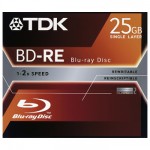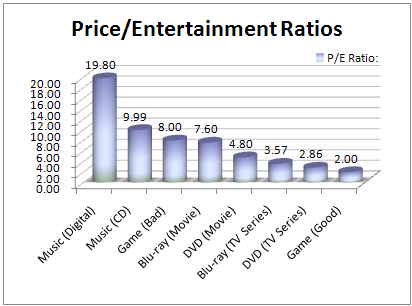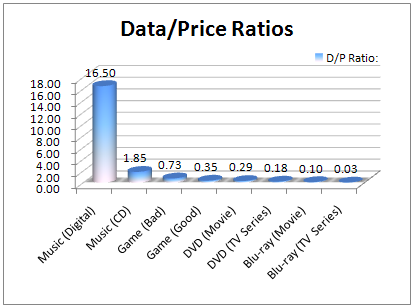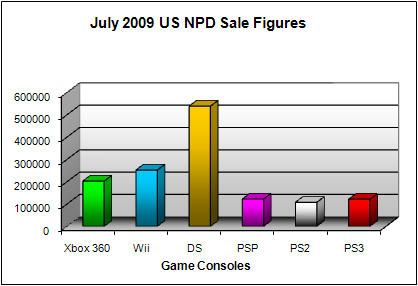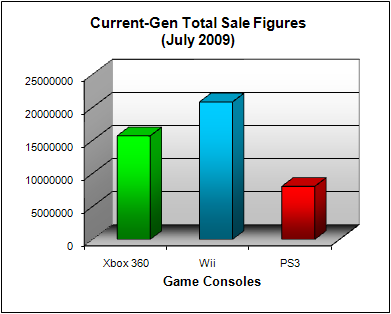Damn, can’t believe August is nearly over already. Can’t believe it’s nearly 2010, you know the year we make contact, and only three years away from the end of the world in December 2012. And there’s still aren’t any flying cars. Meh. Oh, I did as promised and updated the blog post I wrote two weeks ago about the value of digital entertainment, but this time instead of basing it on pricing/length of the entertainment, I did it on the price per “bit” of digital data. Blu-ray, it seems, is the best value if you want to minimize the cost per byte of data you buy. Once again, digital music is the least value, costing 500 times more than Blu-ray on a bit-by-bit basis.

Let’s start with copyright news for this relatively news lite week. The Pirate Bay continues to be attacked by the MPAA, via the Swedish courts. This time, the MPAA has forced the Pirate Bay’s web host’s web host to shut off traffic to TPB, which managed to shut down the torrent listing site for an entire three hours. Millions of dollars spent in legal proceedings don’t give you much, do they?
And as a preview of what could happen if the TPB would go down forever, the temporary downtime of the TPB led to server spikes for the other torrent sites. So unless the MPAA/RIAA go and take down every single torrent website, then people will just move on to the next one. Eventually, someone will open a website in a country that won’t bow down to the MPAA, maybe Antigua or somewhere, and then the MPAA would have finally forced piracy to become fully resilient. Evidence shows this to be the trend, that the more the industry fights against piracy, the harder it becomes to prevent it. Evidence also shows that through more competitive pricing and less DRM, piracy can be reduced.
Going to another big trial going on at the moment, the judge in IsoHunt’s trial actually wants the MPAA to prove direct infringement, of which they have presented zero evidence of it so far. The MPAA are of course outraged, that they would actually have to prove direct piracy, because it might be a bit hard to prove that a text file, which is basically what a .torrent file is, can do any damage at all when it comes to piracy. The text file has to be fed to a software program, which interprets the data, connects to the right trackers, and then through the tracker, connect to users to initiate downloads and uploads. Not exactly direct, and nothing other than the original text file is hosted by torrent sites like IsoHunt – everything else is hosted or produced by someone else, and even at the end of this, you still cannot prove piracy unless a complete copy of a file has been uploaded or downloaded, not just chunks of it. A chunk of a file is just digital garbage, and is neither unique nor will it contain any artistic or commercial value, and hence, no copyright abuse. It would be almost as ridiculous as someone copying a couple of word from an AP news article, and then AP going after them for copyright abuse. Oh.
Going to yet another big trial, a Dutch court has ruled that Mininova must remove all infringing torrents within three month, as the Dutch MPAA, BREIN, has won a court case. It’s funny because Mininova was only set up after Suprnova was shutdown, and Mininova, despite the name, is not much larger and much easier to use than Suprnova. I’m looking forward to see what advances Micronova will have when Mininova goes down, if it goes down. And if you can’t stop torrent sites, then you can go after the people who download them. The UK government is planning to have their own three strikes system that will ban anyone suspected of downloading pirated material. All this will do is to put further pressure on the courts, which might need to handle a couple of thousand claims every week. Happening in the UK, this reminds me of what happened over there in the 19th century, where moral outrage ensure every other poor person were sentenced for trivial crimes, and sent to penal colonies all around the world. Just don’t send them to Australia this time please, because we’ve got enough of our own pirates already.
None of this will actually stop people pirating though. As mentioned above, people will just open new torrent sites that will become super popular instantly. And the people who download pirated material will simply switch to encryption technology, which won’t really slow down downloads that much, but will mean it would be next to impossible to monitor what files you are downloading. So the industry can spend millions on lawsuits, the government can spend millions on new legislation and put further pressure on the judicial system, ISPs can be forced to spend millions on monitoring (which will kill off the smaller ISPs), and further millions can be spent on DRM, but what will all this get you? Piracy that can’t be stopped. Well worth the money spent, if you ask me. For people pirating stuff, and people downloading pirated stuff, that is. Eventually, all of this will force piracy to be even more convenient and private, and then at that time, everyone will do it because they know they can’t get caught anymore. Good one, MPAA.

Let’s get to HD news. Blu-ray may be gaining popularity in the home theater, but hardly anybody is using it on computers, and the situation is likely to continue well into the 2010’s, according to analysts.
There are a lot of reasons why Blu-ray hasn’t taken off on PCs, the main reason may be because other than movies, there’s nothing else that uses Blu-ray. Games could come on Blu-ray instead of 2 or 3 DVDs, but that will only work if most people have Blu-ray drives, and because games can be installed to people’s huge HDDs, the convenience only comes in at installation time. So instead of swapping out the disc once or twice during the install, Blu-ray can save you the trouble, but after this, you will still only ever need to insert one disc into the drive to play the game, whether it is the first DVD, or the single Blu-ray. It’s not like the transition from CD to DVD, because at that time, some CD games came on as many as 5 discs, and because people’s HDDs were smaller, you had to swap discs during play which was really annoying. And even then, the gaming industry successfully resisted using DVD-ROM for gaming for many years.
So without BD-ROM applications, then it comes down to Blu-ray recordables (BD-Rs and BD-REs) to offer huge amounts of storage on a single disc. But do people really need these 25 and 50 GB discs? They aren’t big enough to store a full backup of your PC’s content, usually several hundred GBs in size. They may be too big to store the odd file or two, most people use USB drives for that now. So there is probably a use for them for archival purposes, to store content that you don’t want someone to erase, but then again, 25 GB is a lot to store on an easily lost and damaged disc. The fact is between DVDs, USB thumb drives with ever increasing capacity, external HDD redundant arrays, there may be no place for Blu-ray recordables other than for storing HD movies. Imagine if DVDs were only good for making your own DVD movies, would it have become as popular as it is today?
Plasma TVs are dying, and that’s sad thing, because they are still the best quality, and in some cases, the best value screens on today’s market. LCDs, even the newer LED based ones, cannot hold a candle to the quality plasmas can give you. Candle is an appropriate term to use here because it’s the contrast ratio that usually separates the plasma TV with LCD equivalents. And there aren’t any viewing angle issues either with plasmas. But because plasma panels are hard to scale down, they can’t be used as PC monitors or on even smaller devices, and so the LCDs are much more cost effective to produce. And this is why plasma is dying. OLED will come along one day and replace LCDs and plasmas, both in terms of cost and quality, but for now, it remains a rich man’s toy ($2000+ for a 11″ screen? No thanks).
![]()
And finally in gaming, the reaction to the PS3 Slim is still the focal point of this week’s news. All eyes are on Microsoft to see how they respond, with analysts calling for a Xbox 360 Slim, which Microsoft needs much more than Sony. But Microsoft’s response, or perhaps it was pre-planned all along, is to drop the Pro bundle and reduce the Elite to Pro prices. Something that you would have already heard about back in July, if you read the WNR.
Sales wise, the PS3 Slim should give Sony’s console a much needed boost, particularly in the short term. Remember it won’t be just people who are buying their first PS3, due to the price drop, but there will be many who will buy their second PS3, as another Blu-ray player perhaps. Expect Sony’s console to outsell the Xbox 360 quite handsomely over the next few months, which is good timing on Sony’s part as the holiday season is so close. You won’t get the same effect with the Xbox 360 Elite price reduction, although Natal should see the Xbox 360 remain strong in 2010.

Xbox 360 Slim: Are Microsoft too scared to put out another piece of hardware, after the RRoD fiasco?
And I’m glad I’m not the only one who thinks the PS3 Slim doesn’t look as good as one had hoped. Instead of calling it the PS3 Slim, it really should be the PS3 Flat, because it’s as if they’ve taken the old PS3 and basically flattened it, making it actually lengthier in size. And as Examiner.com article mentions, it may be because it’s far too early the product lifecyle to have a slim SKU, as least compared to what happened with the PS2. Sony couldn’t make the PS3 Slim any smaller without having to suffer cost issues again, and in the end, they didn’t make it as small as it should be. I don’t think this is a problem for the Xbox 360 Slim, as the Xbox 360 is a year older and the PS3, and the technology it uses was already a bit out of date at the time it came out, and while incremental improvements have occurred, there’s large scope for miniaturization, which could help to both decrease cost and improve reliability. But I guess Microsoft’s Xbox 360 hardware division are still suffering from PTSD due to the RRoD issue, and they won’t be too keen to put out another piece of hardware. But I won’t be surprised to if the Xbox 360 Slim makes its appearance right around the time Natal comes out.
WordPress tells me I’ve nearly used up this week’s word limit, so I’ll have to stop now. Have a great week, and I’ll be back next week with the same mix of news, ranting, and outright lies.


